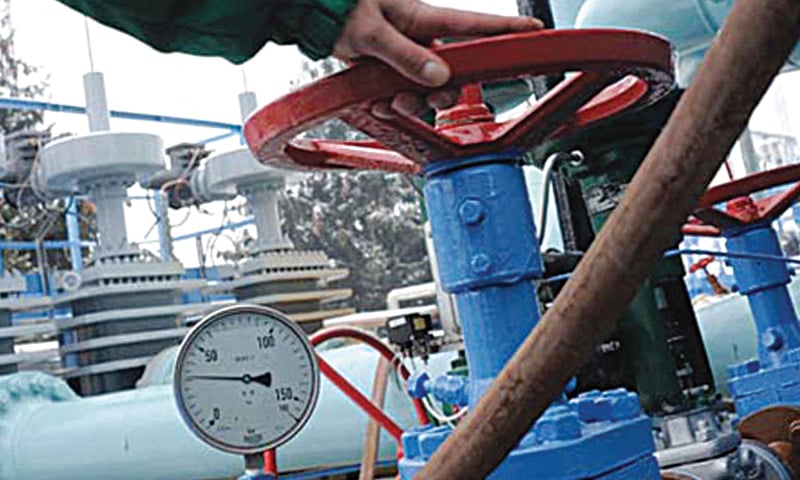ISLAMABAD: The Oil and Gas Regulatory Authority (Ogra) has asked the government to increase prices for gas consumers by up to 221 per cent with effect from January 1, 2020 to generate about Rs40 billion in additional funds required by the two gas utilities.
In two separate judgments forwarded to the government, the regulator determined about 13pc (Rs82 per unit) increase in average prescribed price to Rs707 per unit for Sui Northern Gas Pipelines Ltd (SNGPL). This would generate more than Rs30bn addition revenue to the company over the next six months.
Likewise, the regulator determined an increase of 8pc or Rs57per unit in prescribed price for Sui Southern Gas Company (SSGC) to Rs795 per million British thermal unit (mmBtu). The Karachi-based gas utility is estimated to get about Rs8bn additional revenue between January 1 and June 30, 2020.
Under the current practice, the prescribed price of SNGPL is applicable at a uniform rate across the country including for SSGC. The effective average rate thus works out at Rs707 per unit instead of the existing Rs629.
The regulator said its revenue determinations for the two companies did not involve previous year adjustments but the government could add those amounts to revenue requirements and hence the need for average prescribed price fixation at Rs785 per mmBtu, instead of Rs707 per unit. In that case, the average would have to be increased by 25pc (Rs156 per unit) instead of 13pc.
The government has already hiked gas prices by up to 143pc in September 2018 and up to 191pc this July.
The regulator proposed more than 192pc increase in the price of domestic consumers using 50 cubic meters per month to Rs353.46 per mmBtu from existing Rs121 per unit. Likewise, an increase of about 18pc has been worked out for such consumers using up to 100 cubic metres per month.
On the other hand, Ogra has worked out a reduction of about 4pc for domestic consumers using less than 300 cubic meters. The rate for up to 200 cubic meters would come down to Rs530 per unit and Rs707 per unit for up to 300 cubic meters.
The rates for high-end domestic consumers has been determined to rise 15pc to Rs1,273 per unit for consumption up to 400 cubic metres per month and to Rs1,680 for over 400 cubic meters.
Likewise, Ogra has proposed more than 221pc increase in gas rates for all categories of special commercial consumers (roti tandoors except 32pc increase for those using more than 300 cubic metres per month).
Similarly, a flat increase of 32pc has been proposed for commercial consumers, ice factories, general industrial, registered manufacturers of export products, captive power, cement factories and CNG.
Meanwhile, the regulator proposed 214pc increase in the rates for domestic consumers using less than 50 cubic metres and 27pc for up to 100 cubic metres for SSGC network.
The rise for those consuming between 100-300 cubic metres has been proposed at 3pc while a reduction of 1.35pc has been proposed for high-end consumers.
On the other hand, the regulator has proposed 245pc increase in gas rates for special commercial (roti tandoors) for up to 100 cubic metres and 159pc for up to 200 units.
Ogra reminded that under the law, the federal government was required to advise within 40 days about the revision of prescribed prices, the minimum charge and the sale price for each category of retail consumers for notification.
“If the government fails to so advise within 40 days and the prescribed price for any category of retail consumers determined by Ogra is higher than the cost recently notified sale price for that category of consumers, then Ogra shall be obligated to notify in the official gazette its own prescribed rates as sale price for the said category of retail consumers,” it reminded.
The regulator asked the government that sales prices effective January 1, 2020 be adjusted in a manner that the revenue requirement determined by be fully met. It said that “as a matter of principle under legal domain, all consumer classes should at least pay the average cost of service or the average prescribed price.”
It argued that the first two domestic slabs were highly subsidised when compared to actual cost of service of local gas or the cost of RLNG which was diverted in winter to domestic sector or other alternate fuels. “Therefore, the same has been decided to be rationalised keeping in view the actual cost of service.”
As such, the prescribed price for first two slabs (up to 100 cubic metres) has been determined at 50pc of average cost of service, followed by 75pc of mean prescribed price for up to 200 cubic metres.
The existing fourth slab of up to 300 cubic metres has been aligned equal to average cost of service. Rest of the consumer categories including CNG, commercial, industrial, captive, power and cement, special commercial absorb the remaining shortfall of determined revenue requirement for the said year across the board based on existing prices.
Under the law, the regulator is required to forward its determination to the government latest by May 20 and Nov 20 every year. The government is required to seek any change, if it so consider, to the proposed increase for various consumer categories within 40 days to Ogra for notification with effect from July 1 and Jan 1, but without affecting the overall determined revenues. The gas prices are changed twice a year.
Published in Dawn, December 18th, 2019














































